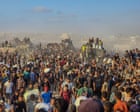
In the heart of a tense and troubled region, the situation in Gaza has recently drawn significant international attention. This comes amid growing concerns over a US-backed aid distribution system that, according to UN Chief António Guterres, poses dire risks to the very people it aims to serve. As the humanitarian crisis deepens, key stakeholders are being prompted to reconsider their strategies and interventions.
Guterres has raised concerns about the current aid model in Gaza, emphasizing reports that many individuals have lost their lives merely attempting to access sustenance for themselves and their families. The system, operating under the auspices of both Israel and the US, has been criticized by organizations such as Médecins Sans Frontières (MSF), which describes the operation as “slaughter masquerading as humanitarian aid.” MSF has called for an immediate cessation of the efforts that have reportedly resulted in casualties exceeding 500 individuals and injuries to nearly 4,000 more.
Amid these distressing developments, the Israeli Defense Forces (IDF) have launched an inquiry into potential war crimes linked to the shootings of Palestinian civilians in the vicinity of these aid distribution points. Reports indicate that hundreds have been killed, either through direct acts of violence or amid exchanges as the IDF asserts control over food distribution efforts. The inquiry aims to authentically assess the situation and hold accountable any unwarranted actions that may have transpired.
Adding to the complexity, a recent Israeli strike in the central Gaza city of Deir al-Balah resulted in the deaths of 18 individuals amidst a targeted assault on a site where Palestinian police were distributing flour. This incident is just one of many that has heightened the humanitarian and political stakes, underscoring the fragility of the situation and the need for a reevaluation of the methodologies employed in aid distribution.
Meanwhile, geopolitical dynamics are further influenced by recent US military actions in Iran. President Donald Trump’s decision to authorize a significant strategic bombing campaign challenges the notion of his previously stated isolationist stance under the “America First” policy. This military move has recalibrated the global perception of the US’s willingness to exert force as a foreign policy tool, potentially altering the diplomatic and military calculus for both allies and rivals worldwide.
In navigating these multifaceted challenges, the international community is being called upon to engage in thoughtful dialogue and cooperation. The goal is to develop policies that not only address the immediate humanitarian needs but also foster a long-term vision of peace and stability. Such a vision must prioritize the dignity and safety of individuals while respecting the sovereignty and agency of nations.
The path forward demands a careful balance between swift humanitarian response and strategic diplomatic engagements. By fostering a global environment of mutual respect and understanding, there lies potential for a more peaceful future, where aid systems strengthen societies rather than imperil their most vulnerable members.
Source: {link}
